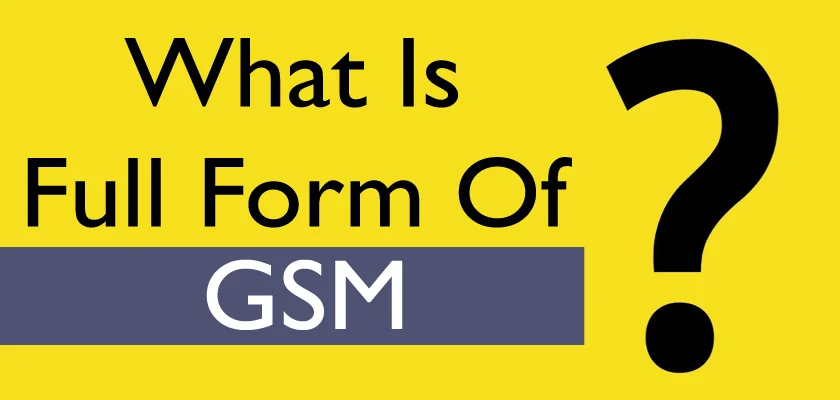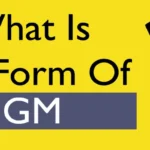Do you know what is the GSM Full Form? The GSM stands for Global System for Mobile Communications. GSM is one of the most widely used cellular network standards in the world. First introduced in Europe in the early 1990s, GSM quickly became the dominant cellular technology worldwide. It is estimated that over 90% of the world’s mobile phones use GSM technology.
Table of Contents
What is GSM?
GSM is a standard technology used for mobile telecommunications across the world. The technology is used for voice, messaging and data services on mobile devices.
History of GSM
The development of GSM began in the 1980s by the European Telecommunications Standards Institute (ETSI). The first GSM network was launched back in 1991, and it has since become the dominant mobile technology worldwide.
GSM Frequency Bands
GSM operates on different frequency bands depending on the region where it is being used. The most commonly used frequency bands are 900 MHz and 1800 MHz, while other regions like the Americas use 850 MHz and 1900 MHz.
GSM Network Components
The GSM network is made up of various components such as:
- The Base Station Subsystem (BSS),
- The Network Switching Subsystem (NSS),
- The Operation and Support Subsystem (OSS).
GSM Channels and Timeslots
GSM divides its frequency bands into multiple channels and timeslots to allow for multiple users to access the network at the same time. Each channel consists of eight timeslots, which can be assigned to different users to use at the same time.

Advantages of GSM Technology
- GSM (Global System for Mobile Communications) is a popular choice for mobile networks due to its many advantages.
- GSM phones are widely available and can be easily unlocked and used on any network that supports GSM, making them highly flexible and convenient for users.
- GSM networks use less power than other cellular networks, which means they extend battery life and require less frequent recharging.
- The technology behind GSM is less expensive to implement than other cellular technologies, which makes it an ideal choice for emerging markets where cost is a major factor.
- Overall, GSM’s popularity can be attributed to its widespread availability, flexibility, power efficiency, and cost-effectiveness.
Disadvantages of GSM Technology
- One major drawback of GSM networks is their susceptibility to interference, which can lead to dropped calls or poor call quality.
- GSM networks are also less secure than other cellular technologies, making them more vulnerable to hacking or interception of sensitive information.
- Another limitation of GSM technology is its reliance on older, slower data transfer protocols, which makes it less suited for data-intensive applications like streaming video or online gaming.
Other GSM Full Forms
If you want to know more about other full forms of GSM Word see the below table:
| Term | Full Form | Category |
| GSM | Global System for Mobile Communications | Mobile Technology |
| GSM | Gheshm | Airport Code |
| GSM | Gprs Session Management | Business Management |
| GSM | Greenwich School of Management | Business Management |
| GSM | Sound (gsm 6.10 Pri-ets 300 036 13kbit/s) (internet Phones) | File Type |
| GSM | Geographic System for Mobile | Geography |
| GSM | General Sales Manager | Job Title |
| GSM | Generalized Second Moment | Maths |
| GSM | General Support Maintenance | Military and Defence |
| GSM | Ground Station Module | Military and Defence |
| GSM | Ground Support Module | Military and Defence |
| GSM | Generic Simulation Manager | Military and Defence |
| GSM | Groupe Speciale Mobile | Telecommunication |
| GSM | Global System for Mobile (communications) | Telecommunication |
FAQs- What Is The GSM Full Form?
Q.1. What is the GSM Full Form?
Ans. The GSM Full Form stands for Global System for Mobile Communications.
Q.2. What does GSM do?
Ans. GSM technology provides a framework for voice and data communication over cellular networks, allowing devices to connect to and communicate with each other.
Q.3. What are the advantages of GSM?
Ans. GSM boasts several advantages, including widespread availability, flexibility, power efficiency, and cost-effectiveness.
Q.4. What are the drawbacks of GSM?
Ans. Despite its advantages, GSM technology is susceptible to interference, less secure than other cellular technologies, and not ideal for data-intensive applications like streaming video or online gaming.
Q.5. Is GSM still used today?
Ans. Yes, GSM is still widely used today, particularly in emerging markets where cost is a major factor. However, newer technologies like 4G and 5G are rapidly gaining popularity and may eventually replace GSM in many areas.
Thanks for reading What is the GSM Full Form? Bookmark our website Whatisfullform.com to know or read our collection of full forms.


